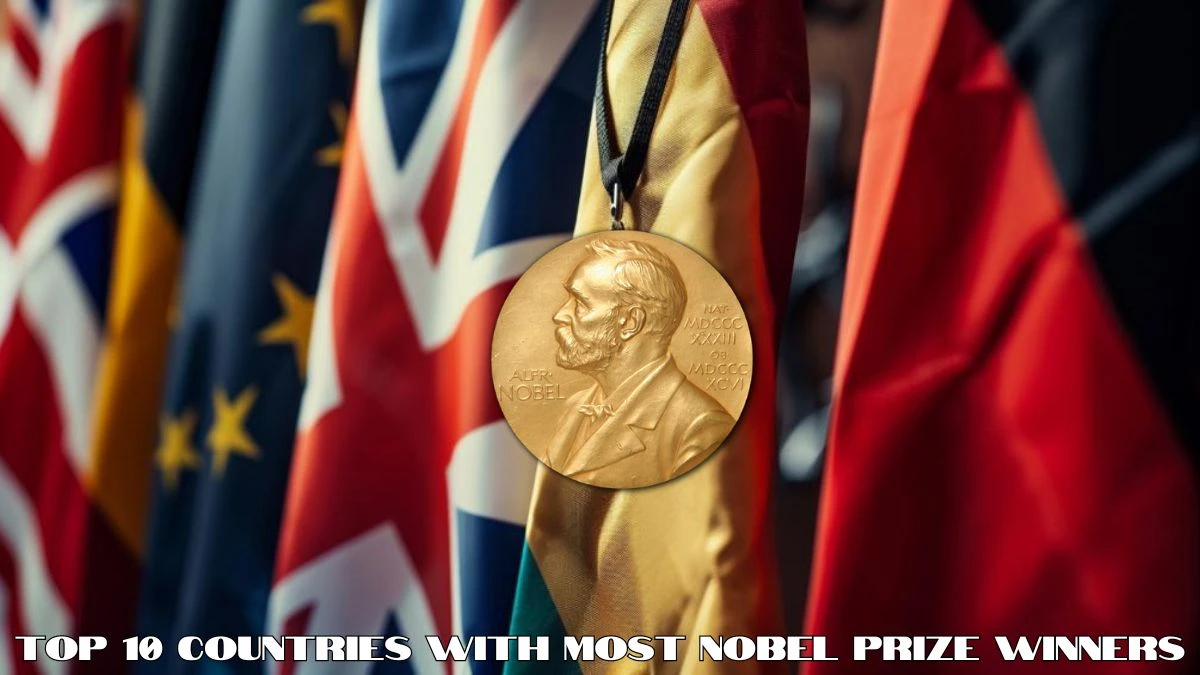Top 10 Countries With Most Nobel Prize Winners - Charting Excellence Across Nations
by B Kishwar
Updated Mar 06, 2024

Top 10 Countries With Most Nobel Prize Winners
S. No |
Country |
Number |
|
1 |
United States |
413 |
|
2 |
United Kingdom |
138 |
|
3 |
Germany |
115 |
|
4 |
France |
76 |
|
5 |
Sweden |
34 |
|
6 |
Russia |
30 |
|
7 |
Japan |
29 |
|
8 |
Canada |
27 |
|
9 |
Austria |
25 |
|
10 |
Switzerland |
25 |
Top Countries With Most Nobel Prize Winners
The Nobel Prize, established by the renowned inventor and philanthropist Alfred Nobel, stands as one of the most prestigious recognitions of human achievement across a diverse array of fields. Since its inception in 1901, this esteemed honor has been bestowed upon individuals and organizations whose contributions have significantly impacted humanity in the realms of Physics, Chemistry, Medicine, Literature, Peace, and Economic Sciences.
As we explore the landscape of Nobel laureates, it becomes evident that certain countries have emerged as veritable powerhouses in producing recipients of this esteemed award. The top 10 countries with the most Nobel Prize winners showcase a fascinating tapestry of innovation, intellect, and cultural influence.
From the United States, with its pioneering spirit and vast resources dedicated to research and development, to the intellectual hubs of Europe like the United Kingdom, Germany, France, and Sweden, each nation brings its unique blend of historical legacy, scientific prowess, and cultural heritage to the global stage of achievement.
Switzerland, Russia, Japan, Canada, and Austria also feature prominently on this list, underscoring the global nature of excellence and innovation. These nations, though diverse in their geographical locations, socio-political landscapes, and cultural traditions, share a common commitment to advancing human knowledge and fostering positive change in the world.
As we delve into the stories of Nobel laureates from these top-ranking countries, we gain insight into the interconnectedness of human endeavor and the profound impact that individuals can have on shaping the course of history.
1. United States (413)
The United States, with its vast resources, robust educational institutions, and culture of innovation, has emerged as the foremost producer of Nobel laureates across various disciplines. In the realm of Physics, luminaries like Richard Feynman, Albert Einstein, and Steven Chu have advanced our understanding of the universe, laying the groundwork for groundbreaking technologies. American Chemistry laureates such as Linus Pauling and Irving Langmuir have revolutionized our understanding of chemical bonds and molecular structures, leading to numerous practical applications in industry and medicine. In Medicine, American scientists like James Watson and Francis Crick unlocked the structure of DNA, paving the way for modern molecular biology and genetics, while Peace laureates such as Martin Luther King Jr. and Jimmy Carter have championed civil rights and global diplomacy.
Moreover, American Literature laureates such as Ernest Hemingway, Toni Morrison, and Bob Dylan have left an indelible mark on the literary landscape, exploring the depths of the human condition and societal transformation through their poignant narratives. In Economic Sciences, figures like Milton Friedman and Paul Samuelson have reshaped our understanding of market dynamics and policy implications, influencing economic theory and practice on a global scale. The United States' unparalleled commitment to research, coupled with its diverse pool of talent and entrepreneurial spirit, continues to foster a fertile environment for intellectual inquiry and innovation, ensuring its continued prominence in the realm of Nobel laureates.
2. United Kingdom (138)
The United Kingdom boasts a rich intellectual tradition and a storied history of scientific and literary excellence, reflected in its impressive tally of Nobel laureates across various fields. British physicists such as Ernest Rutherford, Paul Dirac, and Peter Higgs have made groundbreaking discoveries in the realm of atomic structure and particle physics, fundamentally altering our understanding of the universe. Similarly, British chemists like Dorothy Hodgkin and Frederick Sanger have pioneered techniques for elucidating the structures of complex molecules, laying the groundwork for advances in pharmaceuticals and biochemistry. In Medicine, British scientists such as Alexander Fleming and James Black have revolutionized medical practice with the discovery of penicillin and beta-blockers, respectively, saving countless lives and improving public health globally.
Furthermore, the United Kingdom's literary legacy is exemplified by Nobel laureates such as Rudyard Kipling, Winston Churchill, and Doris Lessing, whose works have captivated readers and enriched the literary canon with their insightful commentary on society, politics, and human nature. Across the spectrum of disciplines, from Peace to Economic Sciences, British scholars and activists continue to make significant contributions to global knowledge and welfare, cementing the United Kingdom's status as a powerhouse of intellectual and cultural achievement on the world stage.
3. Germany (115)
Germany's rich scientific tradition and intellectual heritage have contributed significantly to its impressive tally of Nobel laureates. Renowned for its rigorous academic institutions and groundbreaking research, Germany has produced Nobel Prize winners across various fields, including Physics, Chemistry, Medicine, Literature, and Peace. Notable German laureates include luminaries such as Albert Einstein, who revolutionized our understanding of the universe with his theory of relativity, and Max Planck, whose work laid the foundation for quantum theory. The country's commitment to innovation and excellence in science and technology continues to be reflected in its thriving research institutions, including universities and Max Planck Institutes, fostering an environment conducive to groundbreaking discoveries and advancements that benefit humanity.
Furthermore, Germany's cultural and literary contributions have also earned recognition on the Nobel stage. Writers like Thomas Mann and Hermann Hesse have been honored for their profound insights into the human condition, while figures such as Willy Brandt have been awarded the Nobel Peace Prize for their efforts in promoting reconciliation and diplomacy on the international stage. Germany's multifaceted contributions to knowledge, culture, and peace underscore its enduring influence and significance on the global stage.
4. France (76)
France's long history as a center of art, culture, and intellectual inquiry has positioned it as a prominent hub for Nobel laureates. With a legacy stretching back centuries, France has produced Nobel Prize winners across diverse fields, from Literature and Peace to Physics, Chemistry, and Medicine. Figures like Marie Curie, a pioneering physicist and the first woman to win a Nobel Prize, exemplify France's tradition of scientific excellence and innovation. Additionally, French literature, renowned for its richness and depth, has garnered international acclaim, with authors such as Albert Camus and Jean-Paul Sartre receiving the Nobel Prize in Literature for their profound literary contributions.
Moreover, France's commitment to humanitarian causes and global diplomacy has earned it recognition on the Nobel stage. Leaders like Henri Dunant, the founder of the International Committee of the Red Cross, and organizations like Médecins Sans Frontières (Doctors Without Borders) have been awarded the Nobel Peace Prize for their tireless efforts in alleviating human suffering and promoting peace and solidarity worldwide. France's enduring cultural legacy, coupled with its contributions to science, literature, and peace, reaffirms its status as a beacon of creativity, intellect, and humanism on the global stage.
5. Sweden (34)
Sweden, the home of Alfred Nobel himself, has a rich history of contributions to science, literature, and peace efforts, reflected in its impressive tally of Nobel laureates. The country's scientific achievements span various disciplines, with notable discoveries in Physics, Chemistry, and Medicine. For instance, scientists like Svante Arrhenius, who received the Nobel Prize in Chemistry in 1903 for his groundbreaking work in electrolyte theory, and Arvid Carlsson, awarded the Nobel Prize in Physiology or Medicine in 2000 for his research on neurotransmitters, exemplify Sweden's enduring commitment to scientific advancement.
Moreover, Sweden's literary tradition has also been celebrated on the global stage, producing renowned authors such as Selma Lagerlöf, the first female Nobel laureate in Literature in 1909, and Tomas Tranströmer, who received the same honor in 2011 for his evocative poetry. Beyond academia and literature, Sweden's commitment to peace and humanitarian efforts is exemplified by figures like Dag Hammarskjöld, the second Secretary-General of the United Nations, who was posthumously awarded the Nobel Peace Prize in 1961 for his efforts to promote peace and resolve conflicts worldwide.
6. Russia (30)
Russia, with its rich scientific heritage and cultural legacy, has made significant contributions to various fields recognized by the Nobel Prize. In Physics, Russia has produced pioneering minds such as Lev Landau, who won the Nobel Prize in Physics in 1962 for his groundbreaking theories in condensed matter physics, and Andre Geim and Konstantin Novoselov, who received the award in 2010 for their discovery of graphene, a revolutionary material with numerous applications.
Furthermore, Russian literature has long captivated audiences worldwide, with iconic figures like Boris Pasternak, who was awarded the Nobel Prize in Literature in 1958 for his epic novel "Doctor Zhivago." Russian scientists and authors continue to push the boundaries of knowledge and creativity, contributing to the global intellectual landscape. In addition to scientific and literary achievements, Russia's influence on global politics and peace initiatives has also been recognized, with notable figures like Mikhail Gorbachev receiving the Nobel Peace Prize in 1990 for his role in ending the Cold War and promoting disarmament.
7. Japan (29)
Japan, renowned for its technological innovations and rich cultural heritage, has made significant contributions across various fields, earning it a notable position among the top countries with Nobel Prize winners. In Physics, Japan boasts laureates such as Yoichiro Nambu, who received the Nobel Prize in 2008 for his discovery of the mechanism of spontaneous broken symmetry in subatomic physics. Additionally, the country has made strides in Chemistry, with pioneers like Ryoji Noyori, who was awarded the Nobel Prize in 2001 for his work on chirally catalyzed hydrogenations. Japan's excellence extends to Medicine as well, with notable laureates like Shinya Yamanaka, who was honored in 2012 for his groundbreaking discoveries in stem cell research. These achievements underscore Japan's commitment to scientific advancement and its impact on shaping global knowledge and understanding.
Furthermore, Japan's contributions to Literature are equally noteworthy, with acclaimed writers like Yasunari Kawabata, who became the first Japanese author to win the Nobel Prize in Literature in 1968 for his narrative mastery and exploration of the human condition. Beyond the sciences and humanities, Japan's dedication to peace and humanitarian efforts is exemplified by Nobel laureates such as Kenzaburō Ōe, recognized in 1994 for his advocacy for nuclear disarmament and commitment to social justice. Japan's consistent presence among Nobel Prize winners reflects its unwavering commitment to innovation, creativity, and the pursuit of excellence across diverse disciplines.
8. Canada (27)
Canada, known for its vast landscapes and multicultural society, has made substantial contributions to the global stage of Nobel laureates. In Physics, Canada has produced notable winners such as Arthur McDonald, who shared the Nobel Prize in 2015 for his groundbreaking research on neutrino oscillations, shedding light on the fundamental properties of matter. Moreover, Canada's impact in Medicine is exemplified by laureates like Michael Smith, awarded the Nobel Prize in 1993 for his development of site-directed mutagenesis, a technique pivotal in understanding gene function and treating genetic disorders. Canada's commitment to scientific research and innovation is further evidenced by its contributions to Chemistry, including the work of John Polanyi, who received the Nobel Prize in 1986 for his contributions to the understanding of chemical reactions on surfaces.
In addition to its scientific achievements, Canada's cultural and literary contributions have also been celebrated on the global stage, with Nobel laureates like Alice Munro, honored in 2013 for her mastery of the short story genre and profound insights into human nature. Furthermore, Canada's dedication to peace and humanitarian efforts is exemplified by figures such as Lester B. Pearson, who was awarded the Nobel Peace Prize in 1957 for his pivotal role in resolving the Suez Canal Crisis and fostering international diplomacy. Canada's diverse array of Nobel Prize winners reflects its commitment to excellence, innovation, and the advancement of knowledge for the betterment of humanity.
9. Austria (25)
Austria, a land rich in cultural heritage and intellectual fervor, has made significant contributions to various fields recognized by the Nobel Prize. Notable among its laureates is Erwin Schrödinger, awarded the Nobel Prize in Physics in 1933 for his groundbreaking work on the wave theory of matter. Schrödinger's pioneering research laid the groundwork for quantum mechanics and profoundly influenced the understanding of atomic and subatomic phenomena. In literature, Austrian writer Elfriede Jelinek was honored with the Nobel Prize in Literature in 2004 for her fearless exploration of societal and psychological themes, often through unconventional narrative techniques. Jelinek's works confront issues of power, gender, and identity with uncompromising honesty, earning her international acclaim.
In the realm of peace, Austria boasts significant contributions, including the diplomatic efforts of Bertha von Suttner, the first woman to be awarded the Nobel Peace Prize in 1905. Von Suttner's tireless advocacy for disarmament and international cooperation laid the groundwork for the modern peace movement and influenced key figures such as Alfred Nobel himself. Additionally, Austria's excellence in chemistry is exemplified by the work of Walter Kohn, co-recipient of the Nobel Prize in Chemistry in 1998 for his development of density-functional theory, a cornerstone of computational quantum chemistry. Kohn's contributions revolutionized the field, enabling precise calculations of the properties of molecules and solids with unprecedented accuracy.
10. Switzerland (25)
Switzerland, renowned for its neutrality and commitment to excellence, has produced numerous Nobel laureates across a range of disciplines. In the field of Physiology or Medicine, Werner Arber, along with his colleagues Daniel Nathans and Hamilton Smith, was awarded the Nobel Prize in 1978 for the discovery of restriction enzymes, which revolutionized genetic engineering and paved the way for modern biotechnology. Arber's work laid the foundation for techniques such as gene cloning and DNA sequencing, which have had profound implications for medicine, agriculture, and beyond. Moreover, Switzerland's literary prowess is exemplified by the playwright and novelist Carl Spitteler, who was awarded the Nobel Prize in Literature in 1919. Spitteler's epic work "Olympian Spring" captivated readers with its poetic grandeur and philosophical depth, earning him international acclaim as one of the preeminent literary voices of his time.
In the domain of peace, Switzerland has played a significant role in fostering international dialogue and conflict resolution, epitomized by the efforts of Henri Dunant, the founder of the International Committee of the Red Cross. Dunant was awarded the first Nobel Peace Prize in 1901 in recognition of his humanitarian work and his instrumental role in establishing the Geneva Conventions, which set standards for the treatment of wounded soldiers and prisoners of war. Switzerland's commitment to peace and humanitarianism continues to be reflected in the work of Nobel laureates such as Leopold Ružička, who was awarded the Nobel Prize in Chemistry in 1939 for his research on polymethylenes and higher terpenes, laying the groundwork for the synthesis of important pharmaceuticals and perfumes.
What Are the Notable Contributions of the United States to the Nobel Prize Legacy?
The United States has made substantial and diverse contributions to the Nobel Prize legacy across various fields, ranging from science and literature to peacekeeping and economics. In the realm of Physics, American scientists have been at the forefront of groundbreaking discoveries, earning numerous Nobel Prizes. For instance, Richard Feynman, Julian Schwinger, and Sin-Itiro Tomonaga were jointly awarded the Nobel Prize in Physics in 1965 for their fundamental work in quantum electrodynamics, which laid the foundation for modern particle physics.
Similarly, the United States has been a powerhouse in the field of Medicine, with American researchers and institutions playing pivotal roles in medical breakthroughs. James Watson, Francis Crick, and Maurice Wilkins were awarded the Nobel Prize in Physiology or Medicine in 1962 for their discovery of the structure of DNA, one of the most significant scientific achievements of the 20th century. Furthermore, American physicians and scientists have been recognized for their contributions to understanding diseases such as HIV/AIDS and cancer, leading to advancements in treatment and prevention strategies.
In the realm of Literature, American writers have left an indelible mark on the global literary landscape, with many Nobel laureates celebrated for their literary prowess and cultural influence. Icons such as Ernest Hemingway, Toni Morrison, and Bob Dylan have been honored with the Nobel Prize in Literature for their profound insights into the human condition and their innovative literary styles.
Additionally, the United States has played a crucial role in promoting international peace and diplomacy, reflected in the accolades bestowed upon American statesmen, diplomats, and organizations. Figures like Woodrow Wilson, Jimmy Carter, and the United Nations have been awarded the Nobel Peace Prize for their efforts to advance peace, resolve conflicts, and promote human rights on a global scale.
Moreover, American economists have been recognized for their groundbreaking research and policy contributions, shaping our understanding of economic phenomena and informing policy decisions. Notable laureates such as Milton Friedman, Paul Samuelson, and Joseph Stiglitz have been honored with the Nobel Prize in Economic Sciences for their pioneering work in areas such as monetary theory, welfare economics, and behavioral economics.
The United States' notable contributions to the Nobel Prize legacy underscore its position as a leader in innovation, scholarship, and global engagement across a diverse array of fields.
Top 10 Countries With Most Nobel Prize Winners - FAQs
As of the latest data, the United States has won a total of 383 Nobel Prizes across all categories since the inception of the awards in 1901.
The Nobel Prize in Economic Sciences, often referred to as the Nobel Prize in Economics, was established in 1968 by the Sveriges Riksbank (Sweden's central bank) in memory of Alfred Nobel. It is awarded annually along with the original Nobel Prizes in Physics, Chemistry, Medicine, Literature, and Peace.
Nobel laureates are selected through a rigorous nomination and review process. Nominees are proposed by individuals and organizations with specific qualifications, and selection committees composed of experts in each field evaluate the nominations based on criteria such as the significance and impact of the nominee's work.
Yes, Nobel Prizes can be awarded posthumously, but only if the recipient passes away after the announcement of the award but before the official ceremony. In such cases, the Nobel Prize is typically awarded to the recipient's estate or next of kin.
The amount of prize money awarded to Nobel laureates varies each year and depends on the funds available from the Nobel Foundation. As of recent years, the prize money for each Nobel Prize category is approximately 10 million Swedish kronor (around $1.1 million USD), which is shared among the recipients if there are multiple winners in a category.



